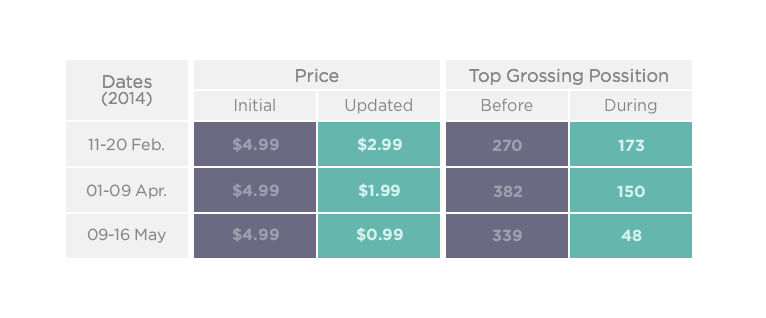Trending
Opinion: How will Project 2025 impact game developers?
The Heritage Foundation's manifesto for the possible next administration could do great harm to many, including large portions of the game development community.

Featured Blog | This community-written post highlights the best of what the game industry has to offer. Read more like it on the Game Developer Blogs or learn how to Submit Your Own Blog Post
This article presents the journey of Ubisoft's "Assassin's Creed Pirates" from a premium app to free-to-play, analyzing all the price adjustments made to increase revenue along the way.

This article was featured as a two-part study case on Craft Arts Group blog.
Free-to-play business model dominates mobile gaming top grossing charts, but many companies in the games industry choose to launch paid Triple A titles based on a combination of strong IP (Intellectual Property), creative ideas and innovative mechanics. Well, some of them eventually become freemium.
Before starting Craft Arts Group, we worked, among other titles, on Ubisoft’s mobile success Assassin’s Creed Pirates. Launched in December 2013 as a paid $4.99 game, it went directly to fourth place in the Top Games Downloads in US AppStore on the first day, and today has more than 10 million installs.
Prior to the launch, Ubisoft worked hard to create a buzz about the new mobile game in Assassin’s Creed franchise by releasing trailers, getting media coverage and even an “App of the Week” feature on AppStore, therefore increasing its target audience.
In the course of the next couple of months, Ubisoft experimented with other methods of boosting the revenue, including AC Pirates in different sales in February (40% off), April (60% off) or May (80% off), all with significant results:

2014 sales periods and their results
Our data reveal that in the first six months, AC Pirates as a paid game managed to gain nearly $1.4 million in revenue from approximately 350k downloads worldwide on all major app stores (Apple App Store, Google Play Store and Amazon App Store).
During 11–18 July 2014, the studio decided to feature AC Pirates as AppStore’s “Free Game of the Week” along with a new update, new daily reward system and most importantly, in-app purchases. This maneuver got the game back up to fourth place—from position 431 before the sale—in Top Games Downloads chart, with more that 3.2 million individual installs and an estimated revenue of $145000.
Using metrics like DAU (Daily Average User) and DARPU (Daily Average Revenue Per User), publishers can also estimate gross revenue forecast by multiplying them by the number of days in the game’s life cycle, for example: F2P Game Gross Revenue Forecast = DAU * DARPU * 30 days * 24 months, which for AC Pirates translated to an estimated $1.58M in the first two years.

AC Pirates Top Games Download chart between Dec 5th, 2013 and Sep. 10th, 2014 —Highlighted sales periods (source: App Annie)
Given the results from July, the next logical step was taken in September 2014 by completely renouncing at the purchase fee and keep Assassin’s Creed Pirates as a free-to-play game. This decision increased the players’ community by reaching new audience and also had a positive financial impact, as data collected shows almost 1.4M downloads and over $147000 in revenue in the first week of freemium.
Since going free-to-play, AC Pirates had 9.4 million downloads with an estimated revenue of $1.7 million, as presented below:

Assassin’s Creed Pirates Downloads/Revenue from September 2014-January 2017 (source: Priori Data)
Recent data shows that more than 4 years from launch, AC Pirates is still going steadily with over 200,000 monthly downloads and over $30,000 monthly income as following:
- December: 200,000 downloads and $40,000 IAP revenue;
- January: 278,400 downloads and $31,000 IAP revenue;
- Mid-February: 115,500 downloads and $14000 IAP revenue.
There are some lessons to be learned from studying the case of Assassin’s Creed Pirates:
Paid games are mostly based on a well-known brand and its community, which give users the trust to spend money before actually getting to play the game; and AC Pirates got a great IP and user base hype following the launch of AC Black Flag just some months earlier that year;
Free-to-play games help publishers reach a larger audience, but this advantage comes with a risk: a less indulgent margin of error, as players must be convinced from the first moments that the game is worth staying and keep playing (and eventually later even pay for advantages or faster advance);
Just the first week of F2P quadrupled the number of downloads in ACP case and made over 10% of the total revenue of the last six months of being a paid app;
Real money in mobile gaming are made from micro-transactions, but don’t push monetization from the start, as many F2P players won’t have any remorse in leaving the game as there are no money invested up front;
Know and measure your KPI (Key Performance Indicators) and always bring new content and/or events in your updates in order to attract more audience and increase your retention rate.
Still not sure how free-to-play games can make money?
Mercantile Works™ is a platform for mobile Free to Play game producers that helps them predict their success right from the start, by simulating multiple monetization scenarios. Reserve your early access.
Read more about:
Featured BlogsYou May Also Like